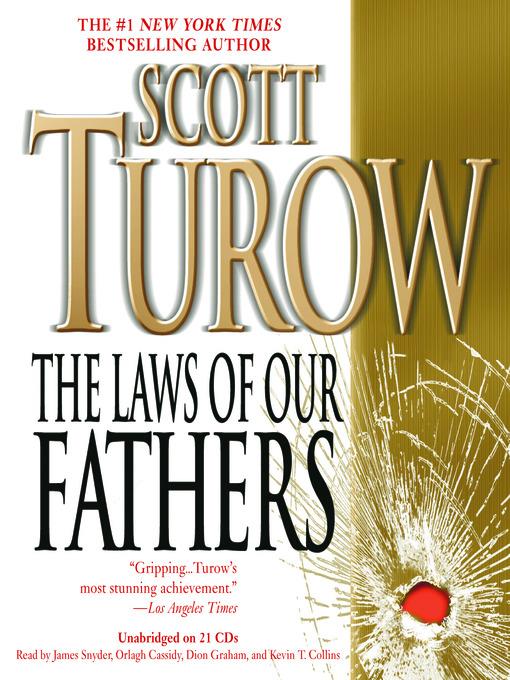
The Laws of Our Fathers
Kindle County Series, Book 4
کتاب های مرتبط
- اطلاعات
- نقد و بررسی
- دیدگاه کاربران
نقد و بررسی

Starred review from October 21, 1996
Unlike some of his fellow lawyers-turned-novelists, Turow takes his time with his books: one every three years since Presumed Innocent. This time it has been spectacularly worth the wait. Laws of Our Fathers is a rich, complex and ultimately profoundly moving tale that, like all Turow's work, is quarried from the mysteries of human character rather than simply from the sometimes too-easy drama of the courtroom. It begins in the gritty setting of an inner city slum and in the mind of a soul-dead black gangster. An ambush is being laid and when it is sprung, the wrong person, an elderly white woman, the wife of a state senator, is dead. Was her hapless son somehow involved in the murder plot, and what role did the senator play? The hot-potato case comes into the court of Judge Sonia (Sonny) Klonsky (remembered from The Burden of Proof), and the courtroom soon looks like Old Home Week as it becomes clear that Sonny, black defense lawyer Hopie Tuttle, state senator Loyell Eddgar, and observing newspaper columnist Seth Weissman all knew each other back in the wild student days of the '60s. The courtroom scenes that follow are swift-moving and surprising, especially since Turow has the nerve to depict a "bench trial,'' in which a judge alone hears evidence, so there is no playing to a jury, and the scenes are worked out dramatically person to person. But the legal aspects of his novel, highly dramatic though they are, are not what most interests the author. The book is in fact basically about family relationships: the passionately leftist Eddgar's with his wife and son; Seth's with his austere, penny-pinching father, survivor of a Nazi death camp; and Sonny's with the memories of her wild communist mother and with her own precious, late-in-life young daughter. Most fine novels have a keen sense of the passage of time, and Turow's grasp of the revolutionary fervor of the '60s and how it has later calmed into rueful, if still compassionate, acceptance, is masterly. A fine stroke too, is his use of the funeral eulogies for Seth's father to sum up, touchingly, what these often embattled and misled people have learned with such difficulty in their lives. There are minor flaws: the multiple personal perspectives in the narrative are not always as well differentiated as they might be, and Sonny's on-again, off-again feelings toward Seth become somewhat repetitious. But these are quibbles in the light of Turow's grandly ambitious achievement: to focus the profoundest struggles of two generations through one sordid, emblematic crime. First serial to Playboy; movie rights sold to Universal; author tour.

Taking place as flashbacks during a murder trial, this novel has its genesis in that intense and confounding era of political and personal change, the Sixties. As narrator Sonia Klonsky, a Superior Court judge, presides over the trial of Nile Eddgar, who is accused of engineering the murder of his mother, a ghetto activist, Turow takes on gang culture, judicial corruption, and radical political movements of the time. Characters are brought to life by Jack Garret, C.J. Critt, and L.J. Ganser. In unique and polished voices the three narrators move seamlessly from the lives inner city African-Americans to the depths of emotion surrounding the Vietnam War. Their delivery is penetrating and articulate, adopting a sober, analytical tone, even when describing intense emotional pain. The trial itself contains skillful twists and turns, which the readers deliver slowly, increasing their impact. K.A.T. (c) AudioFile 2004, Portland, Maine

























دیدگاه کاربران